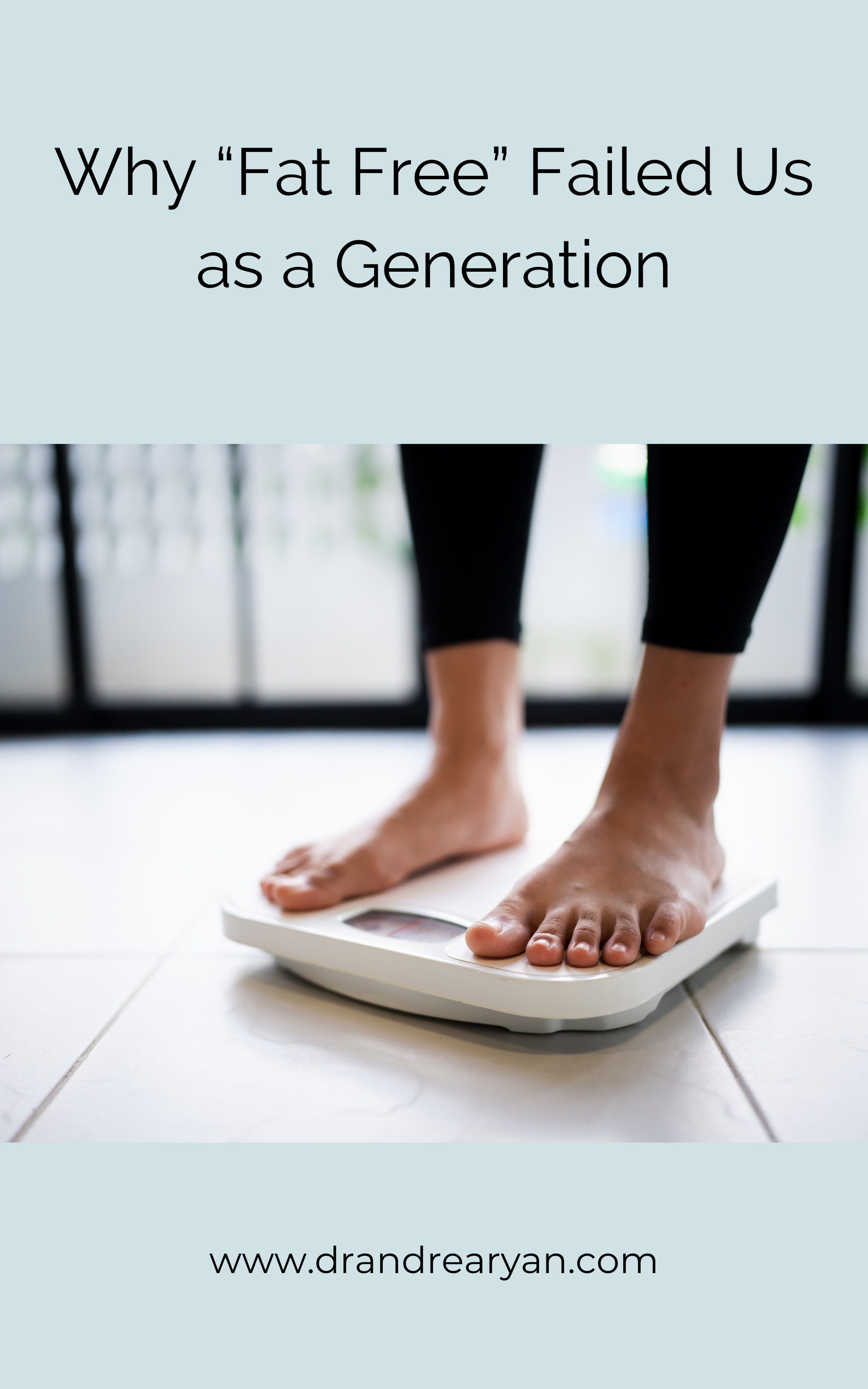Why Fat Free Failed Us
If you grew up in the 80s or 90s, you probably remember the fat-free craze. SnackWell’s cookies? Fat-free frozen yogurt? Margarine tubs the size of your head? We were told fat was the enemy, and the only way to stay slim and “healthy” was to avoid it like the plague.
Looking back, it’s hard not to laugh (and cry a little). Entire grocery aisles were stocked with products that were fat-free but loaded with sugar and additives. The promise was simple: cut out fat, stay thin, and dodge heart disease. Spoiler alert—it didn’t work. Rates of obesity, diabetes, and metabolic issues skyrocketed right alongside the rise of fat-free foods.
And now, decades later, women in perimenopause and menopause are paying the price.
Why the Fat-Free Myth Was So Damaging
The fat-free craze was based on outdated, flawed science that demonized all fats instead of distinguishing between healthy fats (like butter, eggs, whole milk, tallow, coconut oil) and harmful ones (think trans fats and industrial seed oils). By stripping fat from our diets, we lost essential pieces of their importance:
Blood Sugar Dysregulation. With fat missing, meals digest too quickly leaving glucose to flood the bloodstream and then crashes.
Thyroid Suppression. Fats, especially saturated fats, support proper thyroid function. Couple this with the blood sugar dysregulation, the increased stress load lead to lowered thyroid function.
Hormone production needs fat. Cholesterol is the building block for estrogen, progesterone, and testosterone. Without it, your body can’t make or balance these hormones effectively. While 75% of it is made in your liver, the remaining 25% comes from dietary fat intake.
Nutrient Deficiencies. Fat is needed to absorb vitamins A, D, E, and K. Without them, bone health, immunity, skin, and fertility all suffer. Many women from the “fat-free” generation ended up deficient in these fat-soluble vitamins, which has consequences decades later (osteopenia, low immunity, hormone struggles, etc.).
Satiety vanished. Without fat, food doesn’t stick with you. Cue the constant snacking, blood sugar rollercoasters, and hangry episodes.
Going fat free wasn’t doing you any favours.
The Fallout in Perimenopause and Menopause
Fast-forward to midlife. Your hormones are already shifting. Estrogen and progesterone are declining, your thyroid may be more sensitive, and your metabolism isn’t as forgiving. If you’re still carrying fat-free habits from the 90s, here’s what happens:
Worsened hormone imbalance. Without enough dietary fat and cholesterol, your body struggles to make the hormones you do still have capacity for.
Increased hot flashes, anxiety, and sleep struggles. Low progesterone and estrogen leave you more vulnerable to symptoms, and low-fat diets only fan the flames.
Blood sugar chaos. That fat-free muffin spikes blood sugar quickly, then drops it just as fast. In perimenopause and menopause, unstable blood sugar drives weight gain, mood swings, and fatigue.
More cravings and weight gain. Ironically, fat-free living often leads to more body fat storage because your body overcompensates with sugar.
Basically, the diet advice we were fed in our teens and twenties set us up for hormone chaos in our forties and fifties.
What Midlife Women Actually Need
The solution isn’t another diet. It’s about balance—giving your body the nourishment it needs to thrive in this chapter of life:
Bring back healthy fats. Butter, whole milk dairy, coconut oil, eggs, grass-fed beef, tallow—yes, the stuff we were told to fear.
Pair carbs with fats and protein. Balance stabilizes blood sugar and keeps energy steady.
Support hormone health. Remember: cholesterol is not the villain. It’s the raw material your body uses to create hormones and keep your metabolism humming.
Ditch the “fat-free” mindset. It was a marketing ploy, not real science.
The fat-free craze of the 80s and 90s left a lasting imprint on how we view food—but it’s time to let it go. For women in perimenopause and menopause, embracing nourishing fats isn’t just allowed—it’s essential. Your hormones, thyroid, metabolism, and sanity depend on it.
So next time you see a “fat-free” label, remember: it’s not 1995 anymore. Your body deserves better.

